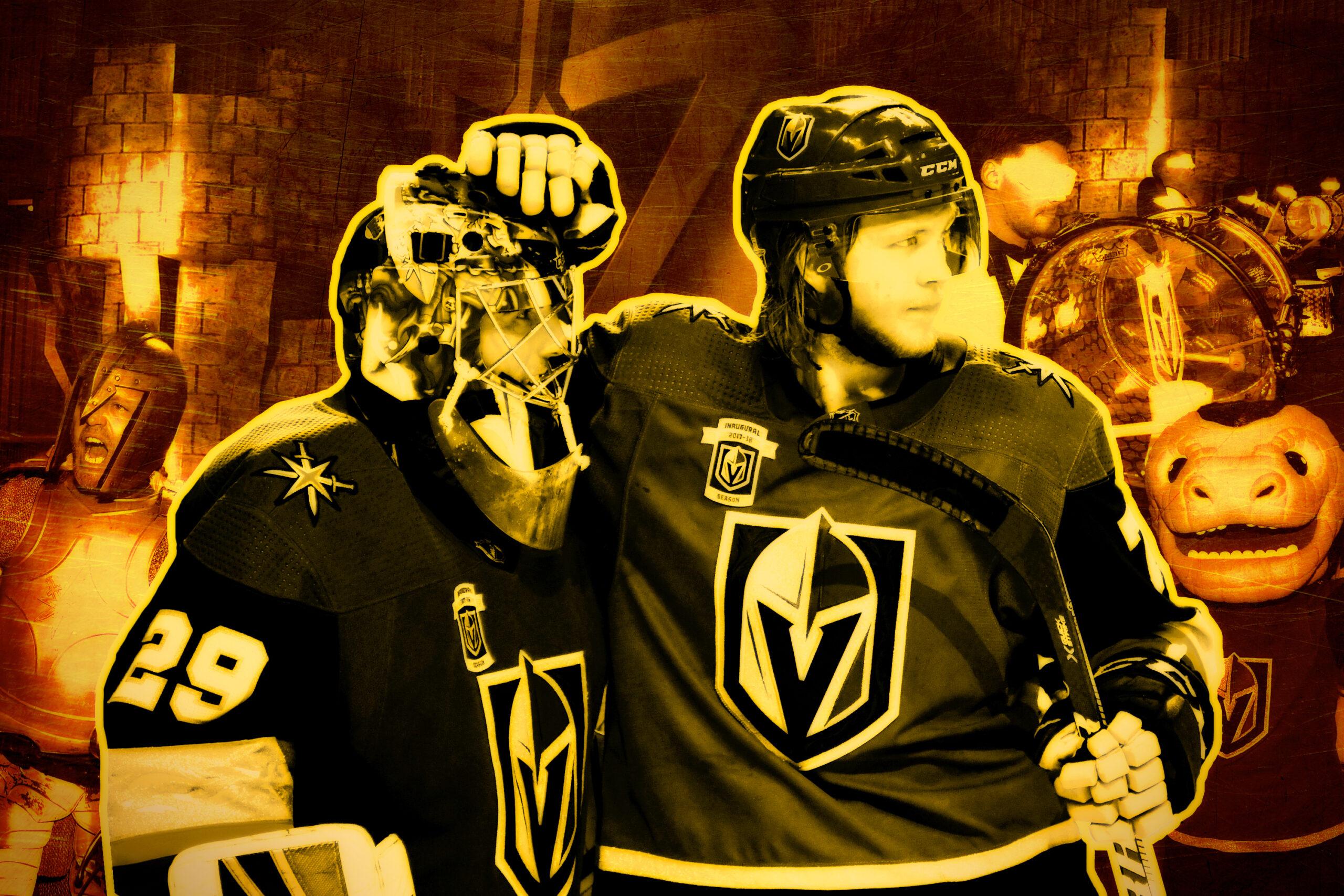
On April 11, the day of the first playoff game for the NHL’s expansion franchise, the Vegas Golden Knights, the team’s Twitter account posted a photo of leading scorer William Karlsson and the hashtag #VegasBorn. The 25-year-old was technically born in Marsta, Sweden, but no matter—it was an unremarkable bit of game-day social media ephemera, or at least it would have been, if the Oakland Raiders hadn’t chosen to retweet it with a four-leaf clover emoji.
Despite the Raiders’ planned move to Las Vegas in the near future, their thirsty support of the ascendant Golden Knights didn’t sit well with fans of the San Jose Sharks, one of the winningest NHL teams of the past decade and also an organization conveniently located in the same state as the Raiders’ current home. Replies ranged from wounded to combative; the official Sharks account posted a GIF of an unimpressed Marshawn Lynch.
The Raiders chose correctly, though. Several weeks later, the Sharks and the Golden Knights met up in the second round of the playoffs: a team with a proud-yet-frustrating history of deep-yet-fruitless postseason runs versus a team with no history whatsoever. Unencumbered by precedent, with no past as prologue, the Golden Knights have instead been free to answer the question: What if Cirque du Soleil performed a mashup of Any Given Sunday and Slap Shot? The day before Game 1, NHL.com columnist Nick Cotsonika described the atmosphere in Las Vegas in a tweet: “The Golden Knights have a DJ, cheerleaders and rally towels. For practice. On a Wednesday morning.” The Golden Knights won Game 1, 7-0. They ousted the Sharks from the playoffs in six games. And now they await the start of the Western Conference final, where they will play the Winnipeg Jets for the right to advance to the Stanley Cup championship series.
A year ago, the Vegas Golden Knights franchise consisted of little more than a color scheme, a cheeky Twitter account, and a blank piece of paper where a roster should be. Since then, Vegas has gone from a group of players unified mostly by the shared experience of having been deemed expendable by their former teams to a group of players unified by starting the season 8-1, winning 51 games, and finishing first in the Pacific Division. “There’s no way they’re going to be a better team than us by the end of the season,” said Los Angeles Kings defenseman Drew Doughty in late December after the Kings fell to the Golden Knights in an overtime game. Vegas swept the Kings in the first round of the playoffs before dispatching the Sharks.
Numerous Golden Knights, from Karlsson to goalie Marc-Andre Fleury to general manager George McPhee, are doing some of the best work of their careers. And enhancing all this on-ice success is the establishment of an infectiously over-the-top brand that has been a hilarious addition to the bound-by-tradition NHL. Pregame festivities at T-Mobile Arena include a loaner Lamborghini, a squad of Daft Punkish “drumbots” wearing stern expressions and LED-bedazzled sunglasses, and choreographed medieval duels on ice.
Vegas owner Bill Foley had high expectations for his expansion franchise, and told reporters more than once that the Golden Knights would make the playoffs by Year 3 and win the Stanley Cup by Year 6. Now, the rookie squad has already checked the first box and is halfway to the second. Depending on one’s personal NHL perspectives and allegiances, this is either an inspiration or an outrage; a source of amusement or of anguish.
No Canadian franchise has won a Stanley Cup in 25 years since Montreal did so in 1993. The Edmonton Oilers and Buffalo Sabres have been trapped in a horrifying rebuilding loop for the past decade, as if part of a sports-themed Black Mirror episode. The teams remaining in this year’s playoffs include the Washington Capitals, who finally got past the second round of the playoffs for the first time in 20 years, and the Jets, whose fan base gained a franchise in the ’70s, was stripped of it in the ’90s, and wasn’t granted another one until 2011. And now they have to all watch Vegas waltz in like it owns the place and immediately thrive. (This Vegas Golden Knights team is basically that “... he just … he tweeted it out” meme, except an NHL franchise.) “I’m excited by the prospect of doing a Vegas Golden Knights special SI commemorative issue,” wrote Sports Illustrated editor Sarah Kwak. “Picking that All-Time team is going to be a BREEZE!” If you listened closely, you could hear Philadelphia Flyers fans gently weeping.
Picking the actual Golden Knights team last summer was a little more complicated. Expansion drafts are what happens when an esoteric, argumentative HFBoards thread makes a wish to become a real boy. Expansion drafts are rare and beautiful procedural eclipses, cosmic crescendos that occur years apart, are never the same twice, and are always kinda ruined by the one friend who has done waaaay too much research beforehand and is eager to discuss it. Expansion drafts turn general managers into Marie Kondos, holding fourth-line centers at arm’s length, asking if they spark joy anymore, and laying them respectfully and ruthlessly in the Goodwill pile.
Seeking to give the new team a chance to compete in the league right away, the NHL established expansion draft rules that enabled teams to protect fewer players than they had been able to in years past. (The last such draft took place in 2000.) In addition to selecting someone from each of 30 NHL teams in the official expansion draft, McPhee, the former GM of the Washington Capitals, also made 10 side trades with teams in which he sought compensation, in the form of players or draft picks, for agreeing to avoid certain players (or, in some cases, for agreeing to acquire albatross contracts). McPhee accumulated 10 draft picks that way, and also selected a few players on expiring contracts, like sniper James Neal and journeyman David Perron, who would ostensibly be appealing trade-deadline assets for contending teams down the road. Except that the contending team turned out to be the Golden Knights—a group that had bonded in the locker room early in the season by reminding one another that they had all been unwanted. That’s important to keep in mind, because now everything looks so different in hindsight, as Vegas has exceeded every possible expectation in Year 1. The Vegas roster may not have scanned as particularly fearsome at the start of the season, but by the start of the playoffs there were numerous NHL teams who were likely re-evaluating the expansion-draft-related transactions they had made and a number of players having the best production of their careers.
Among the key contributors to the Golden Knights success this season were goalie Fleury and the team’s top line of Reilly Smith, Jonathan Marchessault, and Karlsson. The Penguins, who were using Fleury as a backup and were eager to get rid of his contract, gave the Golden Knights a second-round pick in 2020 as a thank-you for taking him off their hands. His .927 save percentage this season has been the best of his 14-year career. “He makes an expansion team not be an expansion team,” was how Golden Knights head coach Gerard Gallant (who signed with Vegas several months after being fired by the Florida Panthers and taking a sad taxi home) assessed Fleury’s impact. Smith and Marchessault, both former Panthers as well, combined for 135 points.
Karlsson, whose low-key personality led a member of the Anaheim Ducks organization to start referring to him as “Wild Bill” the way an imposing bouncer might go by “Tiny,” had scored two, 20, and 25 points in his past three seasons with the Columbus Blue Jackets. In exchange for selecting Karlsson as well as taking on the hefty contract of the injured David Clarkson, Columbus also sent Vegas a 2017 first-round pick and a 2019 second-round pick. And then Karlsson more than tripled his production, scoring 78 points this season to lead the Golden Knights and underpin both the franchise’s unanticipated success and its uncertain future. In February, commissioner Gary Bettman said that if another expansion team were to join the NHL—Seattle is the rumored front-runner—it would face the same expansion draft rules as Vegas. But it’s unlikely that another expansion team would have a player quite like Karlsson, both in terms of the side deal that brought him to Vegas and in terms of the sheer magnitude of his breakout season.
Karlsson’s level of production this year has involved scoring on more than 23 percent of his shots, a success rate that is almost certainly unsustainable in the long term. (Alex Ovechkin, one of the game’s finest scorers, has averaged just north of 12 percent during his career.) This isn’t to say that Karlsson’s role in the speedy, creative Vegas system hasn’t genuinely improved his play, but he hasn’t suddenly become ’80s Gretzky either, however much this between-the-legs goal might suggest otherwise. You can’t stay the hot hand at the table forever.
But no one wants to count out Wild Bill; no one wants to be the one bringing bad vibes to a happy streak; it’s much more fun to just let it ride, even if it probably can’t last. The Vegas Golden Knights are one of just four NHL teams still playing. All season long, the team has beaten long (really long) odds. And yet it still is hard to grasp the idea of this fly-by-night franchise actually winning a Stanley Cup. Why not them, though? “Why wait six years?” is what Fleury told the Associated Press last year after the expansion draft, referring to Foley’s timeline. “I don’t know where I’ll be in six years.” He’s seen firsthand, with the Pittsburgh Penguins, that teams and players never know when the luck will break their way, and he knows they have to be prepared to go all in when it does.
The Golden Knights have done this, whether they really meant to or not, and have turned the organization’s grand opening into a hot ticket, a winning hand, a spectacle—one more Vegas success story in a city forever buzzing and blinking with ludicrous, aspirational tales.

